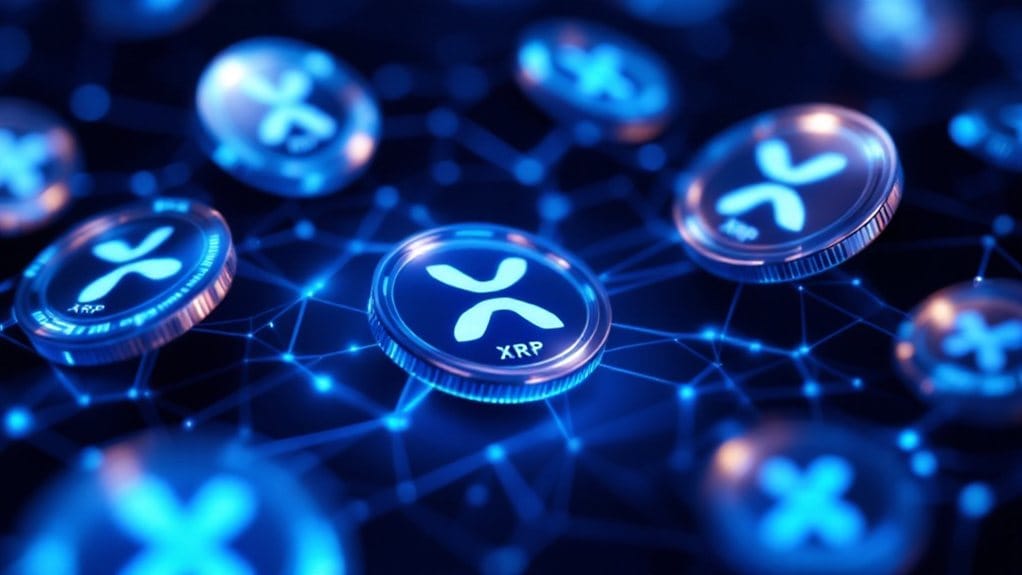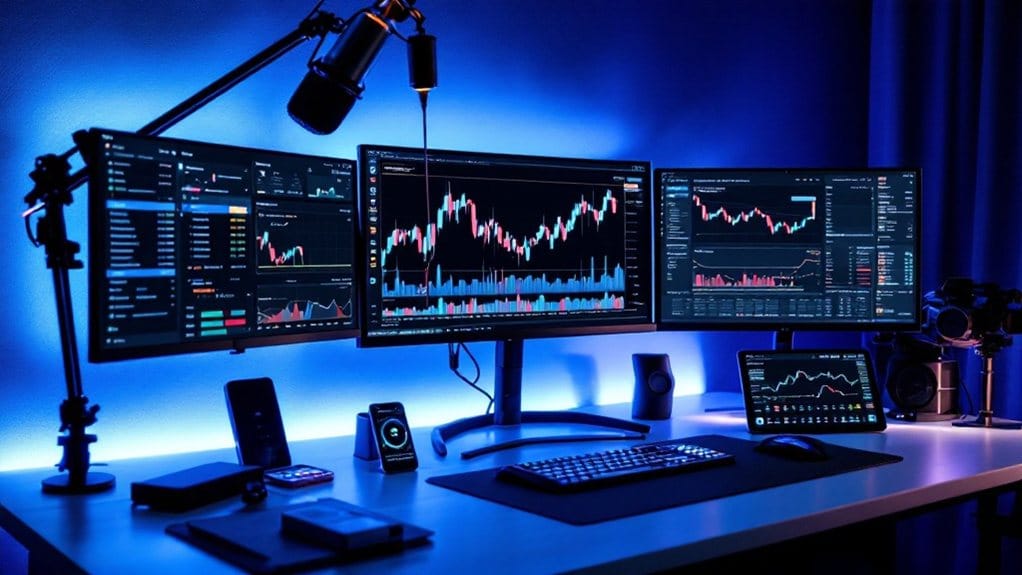Purchasing virtual real estate in the metaverse requires establishing a digital cryptocurrency wallet and acquiring platform-specific tokens, such as ETH for Sandbox or MANA for Decentraland. Investors can buy land parcels through official platform releases or alternative marketplaces like OpenSea, with typical parcels costing around 2.2 ETH. The process involves securing NFT-based property rights through blockchain technology, while location, user traffic, and proximity to virtual landmarks greatly influence property values. Understanding the metaverse’s projected growth to USD 5 trillion by 2030 reveals considerable opportunities in this emerging digital frontier.

In recent years, virtual real estate has emerged as a groundbreaking investment frontier within the metaverse, where digital properties can be bought, sold, and developed using blockchain technology. These digital properties exist as parcels of land or coordinates within virtual worlds, functioning in a like manner to physical real estate with potential for value appreciation over time, and ownership is documented through NFTs stored on the blockchain.
The process of acquiring virtual land requires users to establish a digital wallet and obtain the necessary cryptocurrency specific to their chosen platform. Popular metaverse platforms like Sandbox and Decentraland offer unique opportunities for land acquisition, with each utilizing its own digital tokens for transactions. One early example of value appreciation occurred when Decentraland parcels that initially sold for $20 in 2017 reached approximately $15,000 by 2022. Investors can purchase properties directly during platform land releases or through alternative marketplaces such as OpenSea, while specialized brokers can assist in identifying suitable investment opportunities. A typical land parcel in Sandbox currently costs around 2.2 ETH for interested buyers. Similar to traditional banking systems, these platforms often incorporate centralized elements to enhance user experience and security.
Virtual land acquisition demands a digital wallet and platform-specific cryptocurrency, with options ranging from direct platform purchases to specialized marketplace transactions.
The value of virtual properties is influenced by a range of factors, including location within the virtual world, user traffic patterns, and proximity to popular developments or notable virtual landmarks. Investors can utilize their digital properties for multiple purposes, including renting to other users, developing virtual businesses, or creating interactive spaces for community engagement. Major brands have recognized the potential of virtual real estate for marketing initiatives and customer interaction, contributing to the sector’s growth.
The metaverse real estate market demonstrates significant potential for expansion, with projections indicating a compound annual growth rate of 31.2% through 2028. While early investors have realized substantial returns, the market carries inherent risks due to its volatility and dependence on platform popularity.
The integration of advancing technologies like virtual and augmented reality continues to improve the immersive experience of virtual properties, while blockchain technology guarantees secure ownership records and transaction validity. As the metaverse evolves toward an estimated market value of USD 5 trillion by 2030, virtual real estate represents a unique intersection of digital innovation and traditional property investment principles.
FAQs
Can I Build Anything I Want on My Virtual Land?
Building options on virtual land are subject to platform-specific constraints and regulations.
While creative freedom is extensive, owners must comply with technical limitations, intellectual property laws, and terms of service agreements.
Most platforms allow construction of digital assets like buildings, entertainment venues, and social spaces, though restrictions may apply regarding size, complexity, and content type to maintain platform performance and community standards.
What Happens to My Virtual Property if the Platform Shuts Down?
If a metaverse platform shuts down, virtual property owners face significant risks despite holding valid NFTs.
While blockchain technology preserves ownership records, the actual property becomes inaccessible when servers go offline. Property values typically plummet to zero, and owners have limited legal recourse due to minimal regulatory protections.
Some platforms offer migration options to other metaverse environments, though this isn’t guaranteed and may result in substantial value loss.
Are Virtual Land Prices Affected by Real-World Economic Conditions?
Virtual land prices demonstrate significant sensitivity to real-world economic conditions, particularly through their correlation with cryptocurrency markets and general investment sentiment.
During economic downturns, companies often reduce their metaverse spending, directly impacting virtual land values.
Market data shows that when traditional markets experience volatility, metaverse real estate prices can fluctuate dramatically, as evidenced by the 80% price drop in 2022 during broader economic uncertainty.
Can I Rent Out My Virtual Land to Other Users?
Virtual land can be rented to other users through diverse metaverse platforms, creating opportunities for passive income generation.
Platforms like Decentraland and The Sandbox offer established marketplaces where landowners can list their properties for rent, typically using smart contracts to facilitate transactions.
Rental opportunities include hosting events, advertising space, and gaming experiences, with prices varying based on location, platform popularity, and market demand.
How Do Property Taxes Work for Virtual Real Estate?
Currently, virtual real estate in the metaverse is not subject to traditional property taxes, as it exists outside conventional legal frameworks.
The blockchain-based nature of these digital assets means they operate in a largely unregulated space.
However, users should be aware that cryptocurrency transactions used to purchase virtual land may be subject to capital gains taxes when converting back to fiat currency.









